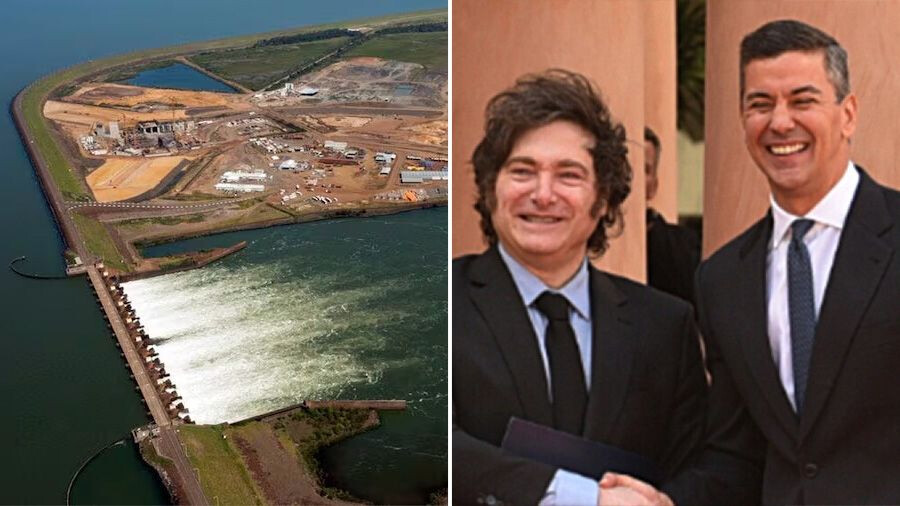
Nicanor Duarte Frutos, former President of Paraguay and Director of the Yacyretá Binational Entity (EBY), asserted that Argentine President Javier Milei's decree to adjust energy rates from $17 to $28 per megawatt-hour (MWh) is a correct measure and does not violate any treaty. Rather, he emphasized that this adjustment sets a realistic rate for energy consumption that the Paraguayan National Electricity Administration (ANDE) and the Argentine Wholesale Electricity Market Management Company (CAMMESA) must pay.
Director Duarte Frutos explained, "If this measure is implemented, the annual billing for the Yacyretá Dam will reach approximately $570 million. Dividing this in half, Paraguay will secure about $270 million annually." He stressed that these funds are crucial for financing public works, hospitals, university scholarships, and social programs.
However, he expressed opposition to Paraguayan President Santiago Peña's decision to integrate Yacyretá scholarships into a national program, calling it a "mistake."
Regarding criticisms that label the rate adjustment agreement as "betrayal," Duarte Frutos dismissed them as politically motivated claims. He criticized, "There is a political intention to frame this as betrayal, and there is ignorance about national interests. When politicians or technicians begin to lose objectivity, they become vulgar comedians." He added, "This agreement resolves many issues and has a validity of five years until Annex C is renegotiated."
Furthermore, he defended the appointment of Miguel María Olmedo as a director of the Yacyretá board, stating, "It is not inappropriate for a doctor to be on the board. Of course, it depends on the will of the appointed person."
Duarte Frutos emphasized that Yacyretá and Itaipu Dams should be viewed not merely as energy production facilities but as institutions contributing to national development in health and education.
President Milei's measure aligns with the 1973 Yacyretá Treaty, reinforcing the equal energy rights and joint ownership between the two countries. The treaty stipulates cooperative energy offtake and economic compensation for unused energy. Luis Benítez, the Paraguayan representative at Yacyretá, also welcomed the rate increase, emphasizing its crucial role in addressing financial difficulties, stabilizing the budget, and supporting projects like the Añá Cuá Dam construction.
The Yacyretá Binational Entity (EBY) stated, "The Yacyretá Binational Entity considers this measure as part of the technical and energy cooperation process between Paraguay and Argentina, and commits to continue working for regional integration, sustainable development, and the mutual benefit of both countries."
The Yacyretá Dam, a hydroelectric dam located on the Paraná River along the Paraguay-Argentina border, is a vital energy resource jointly owned and operated by both nations. The 1973 Yacyretá Treaty provides the basic framework for dam construction and operation, and the distribution of generated electricity. Annex C is a crucial part that stipulates economic compensation from dam operations and future cooperation plans, significantly impacting bilateral relations.
In recent years, the electricity rates of the Yacyretá Dam have been a major point of contention between the two countries. Paraguay has demanded rate increases due to rising dam operation and production costs, while Argentina has maintained a cautious stance considering its economic situation. President Milei's rate adjustment is a result of these long-standing discussions, expected to contribute to Paraguay's financial stability and provide a foundation for expanding investments related to dam operations.
Former President Duarte Frutos' remarks highlight the positive aspects of the rate adjustment while showcasing the internal political debate in Paraguay. In particular, his opposition to the integration of Yacyretá scholarships into the national program suggests diverse opinions on how dam operating revenues should be used. His strong rebuttal against the "betrayal" criticism aims to emphasize that the agreement was the best choice for Paraguay's national interests.
His defense of Miguel María Olmedo's board appointment is also noteworthy. While it may seem unusual for a doctor to be appointed to the board of an energy-related institution, Duarte Frutos justifies his appointment by emphasizing that the Yacyretá Dam should contribute to regional community development, particularly in health, beyond just energy production. This can be understood in terms of the social return of Yacyretá Dam operating revenues.
The welcoming statement from Luis Benítez, the Paraguayan representative at Yacyretá, and the official position of the Yacyretá Binational Entity (EBY) indicate that the rate adjustment is a significant advancement in technical and energy cooperation between the two countries, expected to contribute to promoting mutual benefits. The prospect of positively impacting major projects like the Añá Cuá Dam construction underscores the practical significance of this agreement. The Añá Cuá Dam is a project to build additional hydroelectric facilities downstream from the Yacyretá Dam and is expected to greatly contribute to Paraguay's energy independence upon completion.
The Yacyretá Dam electricity rate adjustment goes beyond a mere change in energy prices, holding significant implications for the relationship between Paraguay and Argentina, particularly in terms of economic cooperation. By resolving the long-standing rate issue, both countries can establish a more stable energy cooperation relationship and create new momentum for joint development. It is necessary to pay close attention to how both countries will address remaining issues, such as the Annex C negotiations, in the future.
[Copyright (c) Global Economic Times. All Rights Reserved.]






























